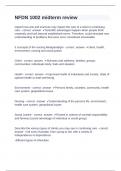NFDN 1002 midterm review
impact how arts and sciences may impact the care of a client in continuing
care - correct answer ✔Scientific advantages happen when people think
creatively and look beyond established norms. Therefore, could stimulate new
understanding of problems that were once considered irresolvable
5 concepts of the nursing Metaparadigm - correct answer ✔client, health,
environment, nursing and social justice
Client - correct answer ✔Sickness and wellness, families, groups,
communities; individuals body, feels and situation
Health - correct answer ✔improved health of individuals and society. State of
optimal health or total well-being
Environment - correct answer ✔Persons family, societies, community, health
care system, geopolitical issues
Nursing - correct answer ✔Understanding of the persons life, environment,
health care system, geopolitical issues
Social Justice - correct answer ✔Rooted in notions of societal responsibility
and fairness (social advantage of individual or social group)
Describe the various types of clients you may see in continuing care - correct
answer ✔all sorts of people, from young to old. with a variety of
independence to dependence.
-different types of ethnicities
,therapeutic communication - correct answer ✔Encourage the expression of
feelings and ideas and convey acceptance and respect
-you develop awareness by learning these techniques
*active listening, sharing observations, sharing empathy, sharing hope,
sharing humour, sharing feelings, using touch, silence
Non-therapeutic - correct answer ✔Hinder or damage professional
relationships discourage further expression of feelings and ideas, may
engender negative responses or behaviours in other people
patients with speaking challenges - correct answer ✔simple questions, be
patient, allow time, visual cues, one person speaking at a time, do not shout,
encourage, let them know If you dont understand, collaborate with a speech
therapist, use communication aids
Patients who are unresponsive/dying - correct answer ✔call by name, use
verbal and touch, speak as though they can hear you, explain everything,
provide orientation to person, place, time and self, don't talk about them to
others where they could hear you, always assume they can hear you
Patients with cognitive challenges - correct answer ✔Reduce environmental
distractions, capture attention before you speak, simple sentences, one
question at a time, allow time, be an attentive listener, include family and
friends in conversations
Patients with vision challenges - correct answer ✔check for use go glasses
or contacts, identify yourself when you enter or exit a room, speak at normal
volume, do not rely on gestures and nonverbal communication, use indirect
sunlight, appropriate font size
, Patients with hearing challenges - correct answer ✔Check for presence of
hearing aids, reduce environmental noise, get attention before you speak,
face the patient, do not chew gum, speak at a normal volume, rephrase rather
than repeat, provide sign language interpreter
Patients with linguistic challenges - correct answer ✔speak in normal tone of
voice, establish a method to signal communication (call bell), provide
interpreter as needed, develop communication board, pictures or cards,
translate words from English to their language, ensure a dictionary is available
for them to read
describe how to report information to the interdisciplinary health-care team in
a professional manner - correct answer ✔-create a shared understanding
through an exchange of knowledge, skills and expertise within a moral/ethical
framework of practice
-SBAR
-each member of health care team need to document patient information
Identify the purposes of effective documentation in nursing - correct answer
✔Accurate, purpose is to provide proof of health cause provided, so tasks are
repeated care isn't fragmented, no delays or omissions In care
identify responsibilities related charting including a nurses responsibility to
maintain confidentiality of records and reports - correct answer ✔-electronic
documentation has legal risks
-protection of info and computer systems is top priority
-Only the health care team directly involved in care can access medical
records
-keep client info confidentiality
-using health care records-need granted permission




